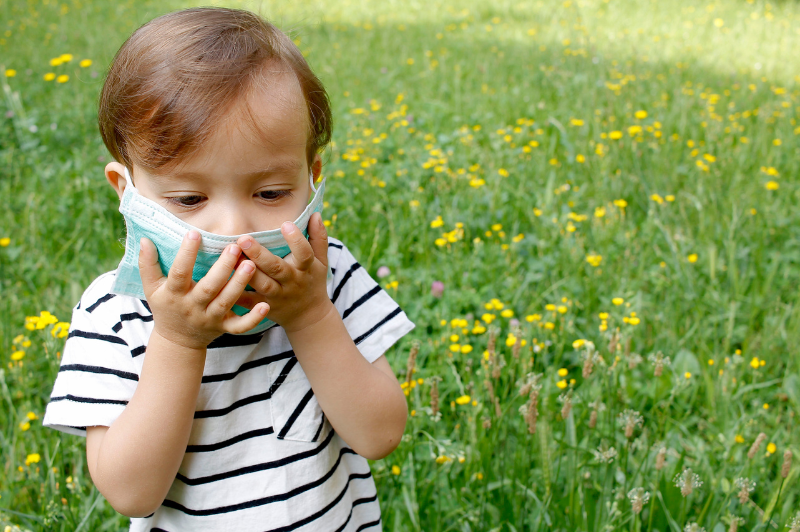
When springtime comes around, we want your kids to be able to play outside and enjoy the beautiful warm weather! But when your child suffers from seasonal allergies, outdoor play becomes much less fun. Did you know that seasonal allergies can be prevented and treated naturally with the help of a Naturopathic Doctor?
Why seasonal allergies?
Seasonal allergies are the immune symptoms that develop with exposure to an environmental allergen, such as grass, pollen, weed pollen, tree pollen, animal dander, dust mites, mould spores, and more. In Canada, allergy season usually starts in April and can continue all summer and even into the fall depending on the type of allergy and the severity. By avoiding triggers, supporting the immune and digestive systems, decreasing inflammation, and consuming natural anti-histamines, we can see great improvements in allergy symptoms in children (and adults too!). Let me lay them out for you:
Avoiding Triggers
This can be the most challenging strategy with environmental allergies but the more information you can gather, the better you’re able to understand and avoid these triggers.
Talk to an allergist (this requires a referral from your medical doctor) to get proper testing for your child. Figuring out your child’s specific allergy helps you better understand how to minimize their exposure to the allergen.
Consider food sensitivity testing. Eliminating your child’s food sensitivity from their diet will support their immune system function, digestion, and decrease excess inflammation. The fewer allergens the body has to deal with at one time, the better. A Naturopathic Doctor can support you with getting testing, interpreting the results and establishing a supportive and appropriate diet for your child.
Supporting the Immune and Digestive Systems
Seasonal allergies are associated with an overactive immune system. Luckily, we have great options for balancing your child’s immune system. We can start with supporting the foundations of health, including sleep, stress, diet, and activity level. Then, we can consider the addition of the following two nutritional supplements.
Vitamin D. Low levels of Vitamin D are associated with seasonal allergies. Proper supplementation can help avoid a deficiency and support the immune system.
Probiotics. A large part of the immune system is located in the gut. Probiotics are an effective treatment for improving digestion and decreasing symptoms of seasonal allergies.

Decreasing Inflammation
When the immune system becomes overly reactive, it can cause excess inflammation in the body. Focusing on your child’s diet with the following recommendations is a great way to manage inflammation and improve allergy symptoms.
Omega 3 fatty acids. Aim for at least 3 servings of fish per week. It can also be beneficial to consider an additional fish oil supplement to get the therapeutic dose of omega 3 fatty aids.
Bioflavonoids. These are the colourful compounds in fruits and vegetables. Work on ensuring your kids get 5-8 servings of fruits and veggies daily.
Limit added sugar. Sugar decreases the immune system’s ability to function and can be even more inflammatory. It is recommended that children get no more than the equivalent of 6 tsp or 25g of sugar daily. Check your food labels for sugar added – sugar comes in many different names and forms!
Consume Natural Anti-Histamines
Did you know that anti-histamines don’t only come in the form of a pharmaceutical medication? We can find them all around us! Three amazing natural anti-histamines are vitamin C, quercetin, and stinging nettle. Vitamin C. Aim to give your child Vitamin C from whole fruits and vegetables or from an added supplement, as opposed to fruit juices (which are high in sugar). Fruits and vegetables that are high in vitamin C include bell peppers, citrus fruits, and strawberries.
Quercetin. This is a bioflavonoid found in most red, green, and purple fruits and vegetables, including apples, berries, tomatoes, and leafy greens. It is also available in supplement form.
Stinging Nettle. Consume nettle leaf as a tea for its beneficial effects of decreasing allergy symptoms. It has a mild flavour and is often well tolerated by kids. If not, you can try making it as an iced tea and add some honey and lemon for added flavour.
As you can see, there are lots of natural options to reduce seasonal allergy symptoms in your kids! Also, many of these ideas are safe and effective during pregnancy and while breastfeeding. Book an appointment with one of our naturopathic doctors for more information on how you can treat your allergy symptoms. We want to help you and your kids get outside and enjoy the sun this season!





